Mentor Assessing: Report on Clinical Practice Assessment of Students
VerifiedAdded on 2021/06/17
|9
|3215
|52
Report
AI Summary
This report provides a comprehensive analysis of mentor assessment within the context of nursing clinical practice, specifically focusing on the Community Substance Misuse Clinic. It delves into the importance of assessment strategies in clinical settings, highlighting both positive and negative aspects. The report explores the roles and responsibilities of mentors, including their accountability in ensuring student competency and addressing the challenges they face, such as the 'fail to fail' phenomenon. It also examines the validity and reliability of assessment methods, the support systems available for both mentors and learners, and the impact of assessment on student development. Furthermore, the report reviews relevant literature, covering topics such as the mentors role and accountability in relation to assessment, the challenges faced by mentors, and the support for both mentor and learner in assessment in practice implementation. The report emphasizes the critical role of mentors in facilitating learning, supervising students, and assessing their progress to ensure they meet the required standards for practice.
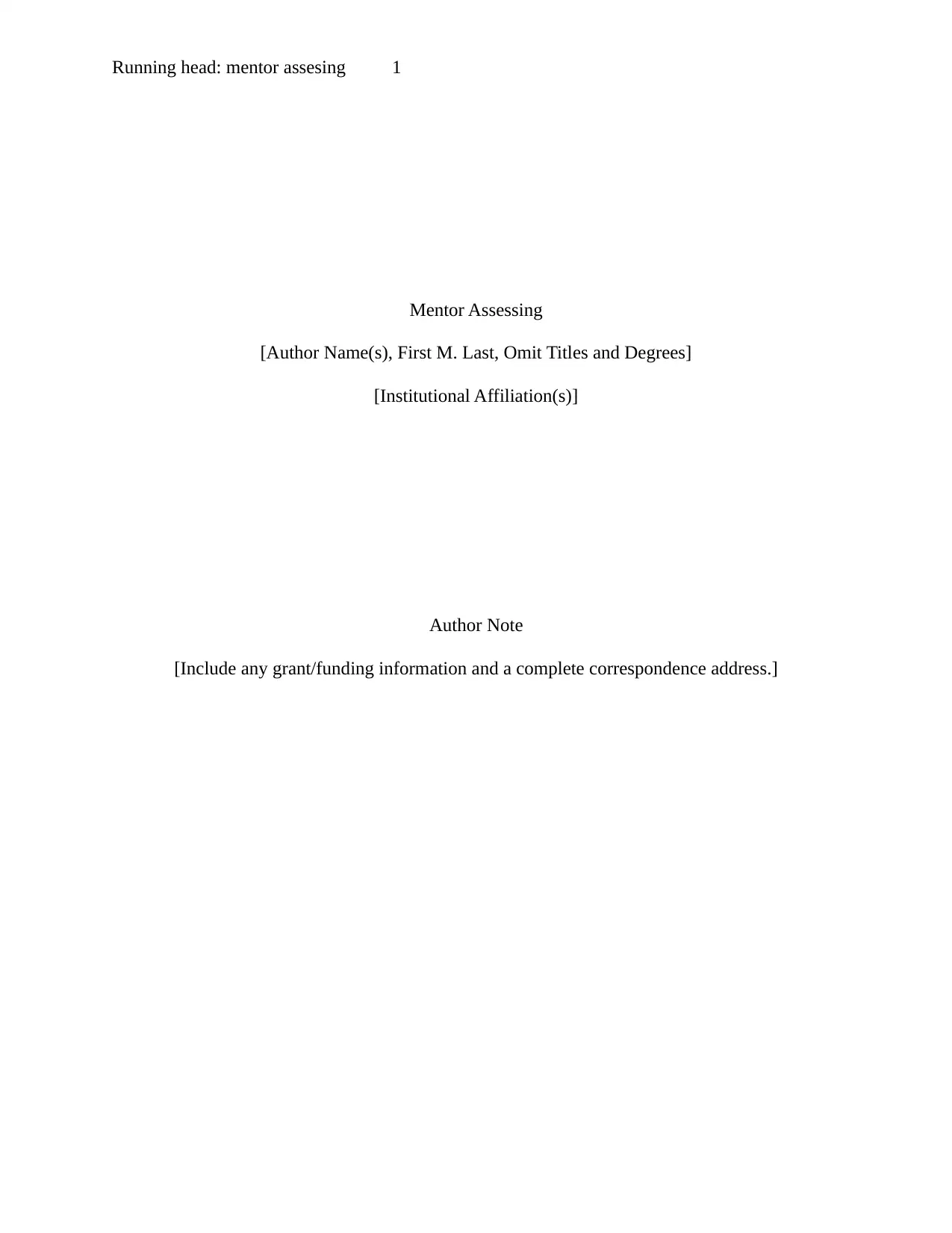
Running head: mentor assesing 1
Mentor Assessing
[Author Name(s), First M. Last, Omit Titles and Degrees]
[Institutional Affiliation(s)]
Author Note
[Include any grant/funding information and a complete correspondence address.]
Mentor Assessing
[Author Name(s), First M. Last, Omit Titles and Degrees]
[Institutional Affiliation(s)]
Author Note
[Include any grant/funding information and a complete correspondence address.]
Paraphrase This Document
Need a fresh take? Get an instant paraphrase of this document with our AI Paraphraser
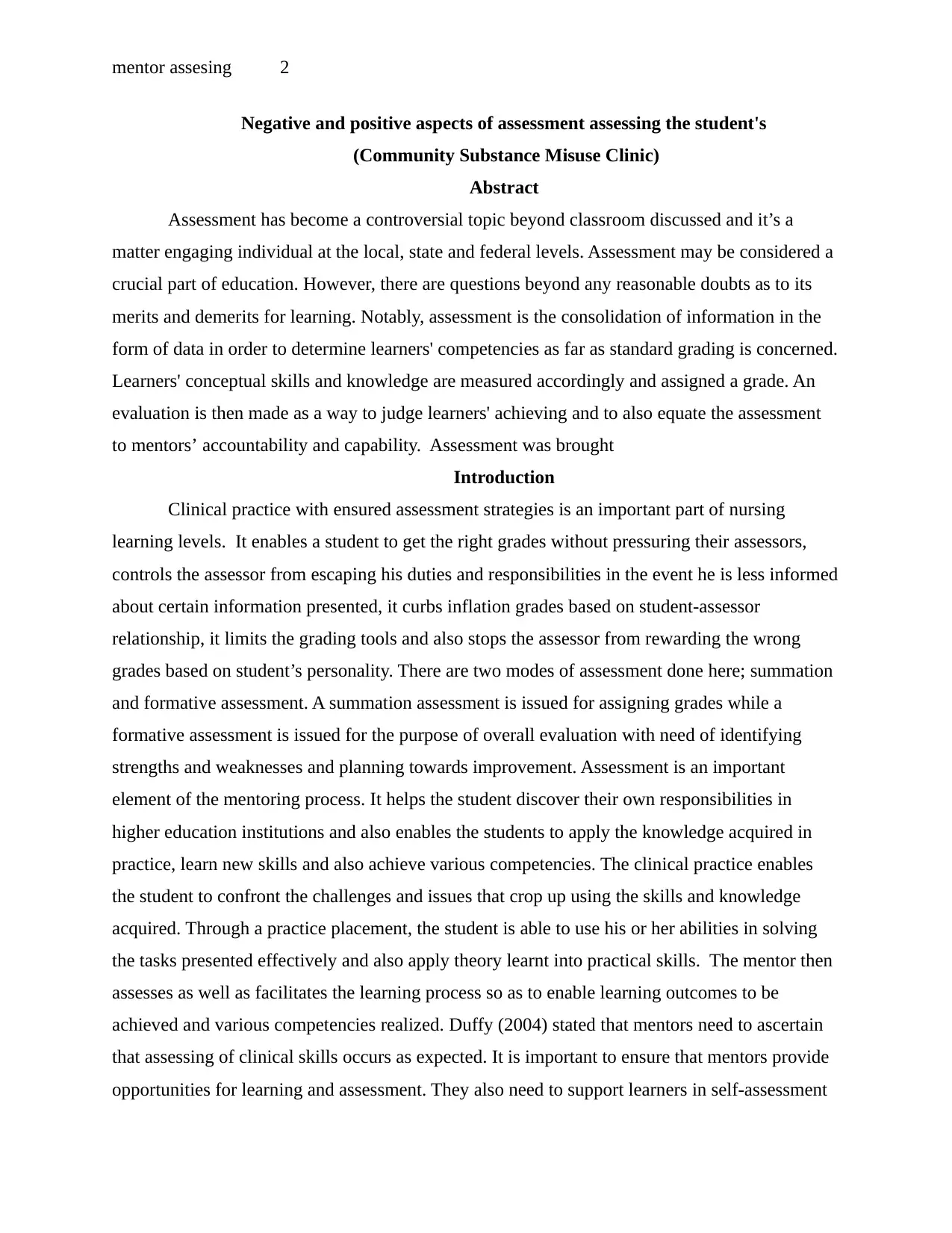
mentor assesing 2
Negative and positive aspects of assessment assessing the student's
(Community Substance Misuse Clinic)
Abstract
Assessment has become a controversial topic beyond classroom discussed and it’s a
matter engaging individual at the local, state and federal levels. Assessment may be considered a
crucial part of education. However, there are questions beyond any reasonable doubts as to its
merits and demerits for learning. Notably, assessment is the consolidation of information in the
form of data in order to determine learners' competencies as far as standard grading is concerned.
Learners' conceptual skills and knowledge are measured accordingly and assigned a grade. An
evaluation is then made as a way to judge learners' achieving and to also equate the assessment
to mentors’ accountability and capability. Assessment was brought
Introduction
Clinical practice with ensured assessment strategies is an important part of nursing
learning levels. It enables a student to get the right grades without pressuring their assessors,
controls the assessor from escaping his duties and responsibilities in the event he is less informed
about certain information presented, it curbs inflation grades based on student-assessor
relationship, it limits the grading tools and also stops the assessor from rewarding the wrong
grades based on student’s personality. There are two modes of assessment done here; summation
and formative assessment. A summation assessment is issued for assigning grades while a
formative assessment is issued for the purpose of overall evaluation with need of identifying
strengths and weaknesses and planning towards improvement. Assessment is an important
element of the mentoring process. It helps the student discover their own responsibilities in
higher education institutions and also enables the students to apply the knowledge acquired in
practice, learn new skills and also achieve various competencies. The clinical practice enables
the student to confront the challenges and issues that crop up using the skills and knowledge
acquired. Through a practice placement, the student is able to use his or her abilities in solving
the tasks presented effectively and also apply theory learnt into practical skills. The mentor then
assesses as well as facilitates the learning process so as to enable learning outcomes to be
achieved and various competencies realized. Duffy (2004) stated that mentors need to ascertain
that assessing of clinical skills occurs as expected. It is important to ensure that mentors provide
opportunities for learning and assessment. They also need to support learners in self-assessment
Negative and positive aspects of assessment assessing the student's
(Community Substance Misuse Clinic)
Abstract
Assessment has become a controversial topic beyond classroom discussed and it’s a
matter engaging individual at the local, state and federal levels. Assessment may be considered a
crucial part of education. However, there are questions beyond any reasonable doubts as to its
merits and demerits for learning. Notably, assessment is the consolidation of information in the
form of data in order to determine learners' competencies as far as standard grading is concerned.
Learners' conceptual skills and knowledge are measured accordingly and assigned a grade. An
evaluation is then made as a way to judge learners' achieving and to also equate the assessment
to mentors’ accountability and capability. Assessment was brought
Introduction
Clinical practice with ensured assessment strategies is an important part of nursing
learning levels. It enables a student to get the right grades without pressuring their assessors,
controls the assessor from escaping his duties and responsibilities in the event he is less informed
about certain information presented, it curbs inflation grades based on student-assessor
relationship, it limits the grading tools and also stops the assessor from rewarding the wrong
grades based on student’s personality. There are two modes of assessment done here; summation
and formative assessment. A summation assessment is issued for assigning grades while a
formative assessment is issued for the purpose of overall evaluation with need of identifying
strengths and weaknesses and planning towards improvement. Assessment is an important
element of the mentoring process. It helps the student discover their own responsibilities in
higher education institutions and also enables the students to apply the knowledge acquired in
practice, learn new skills and also achieve various competencies. The clinical practice enables
the student to confront the challenges and issues that crop up using the skills and knowledge
acquired. Through a practice placement, the student is able to use his or her abilities in solving
the tasks presented effectively and also apply theory learnt into practical skills. The mentor then
assesses as well as facilitates the learning process so as to enable learning outcomes to be
achieved and various competencies realized. Duffy (2004) stated that mentors need to ascertain
that assessing of clinical skills occurs as expected. It is important to ensure that mentors provide
opportunities for learning and assessment. They also need to support learners in self-assessment
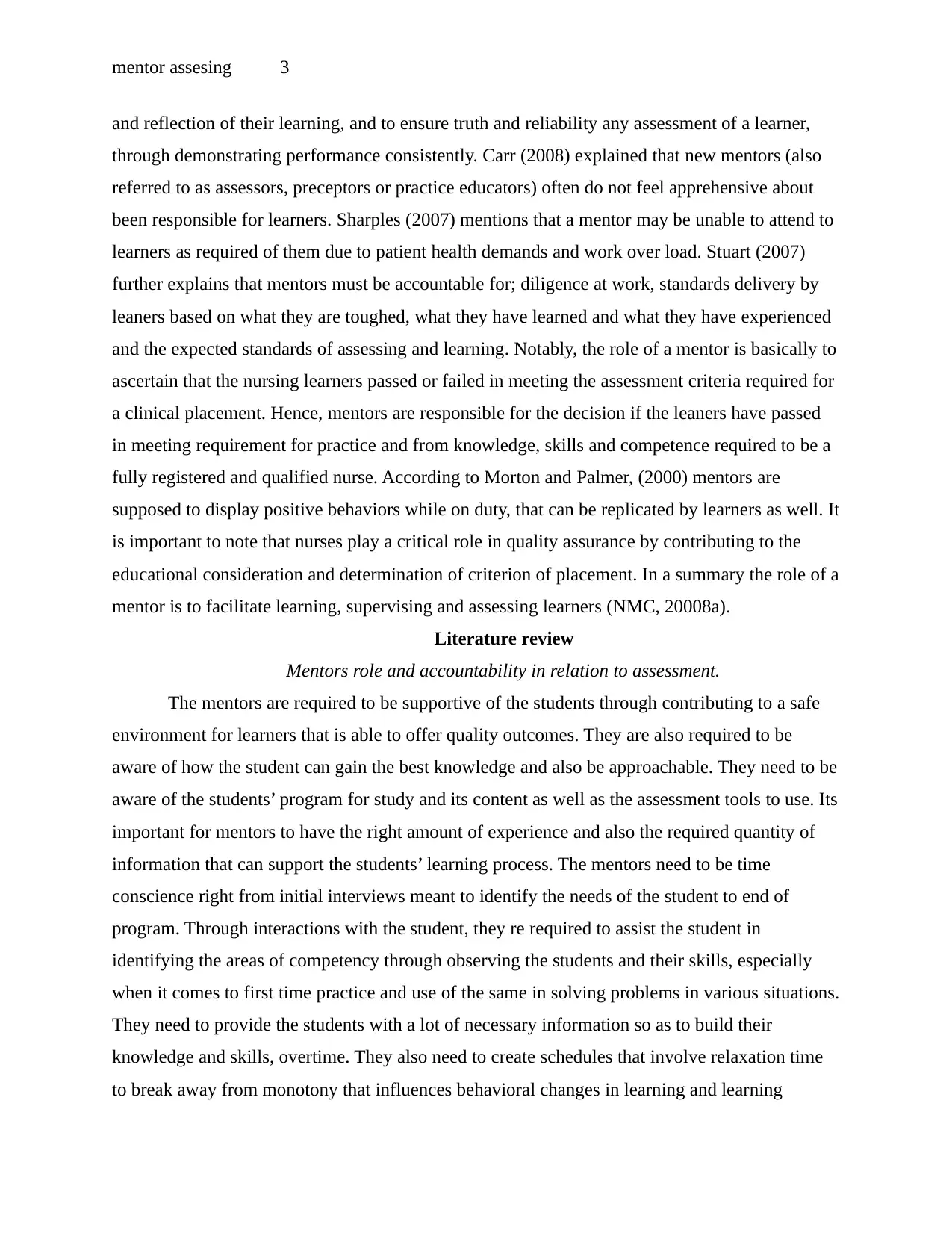
mentor assesing 3
and reflection of their learning, and to ensure truth and reliability any assessment of a learner,
through demonstrating performance consistently. Carr (2008) explained that new mentors (also
referred to as assessors, preceptors or practice educators) often do not feel apprehensive about
been responsible for learners. Sharples (2007) mentions that a mentor may be unable to attend to
learners as required of them due to patient health demands and work over load. Stuart (2007)
further explains that mentors must be accountable for; diligence at work, standards delivery by
leaners based on what they are toughed, what they have learned and what they have experienced
and the expected standards of assessing and learning. Notably, the role of a mentor is basically to
ascertain that the nursing learners passed or failed in meeting the assessment criteria required for
a clinical placement. Hence, mentors are responsible for the decision if the leaners have passed
in meeting requirement for practice and from knowledge, skills and competence required to be a
fully registered and qualified nurse. According to Morton and Palmer, (2000) mentors are
supposed to display positive behaviors while on duty, that can be replicated by learners as well. It
is important to note that nurses play a critical role in quality assurance by contributing to the
educational consideration and determination of criterion of placement. In a summary the role of a
mentor is to facilitate learning, supervising and assessing learners (NMC, 20008a).
Literature review
Mentors role and accountability in relation to assessment.
The mentors are required to be supportive of the students through contributing to a safe
environment for learners that is able to offer quality outcomes. They are also required to be
aware of how the student can gain the best knowledge and also be approachable. They need to be
aware of the students’ program for study and its content as well as the assessment tools to use. Its
important for mentors to have the right amount of experience and also the required quantity of
information that can support the students’ learning process. The mentors need to be time
conscience right from initial interviews meant to identify the needs of the student to end of
program. Through interactions with the student, they re required to assist the student in
identifying the areas of competency through observing the students and their skills, especially
when it comes to first time practice and use of the same in solving problems in various situations.
They need to provide the students with a lot of necessary information so as to build their
knowledge and skills, overtime. They also need to create schedules that involve relaxation time
to break away from monotony that influences behavioral changes in learning and learning
and reflection of their learning, and to ensure truth and reliability any assessment of a learner,
through demonstrating performance consistently. Carr (2008) explained that new mentors (also
referred to as assessors, preceptors or practice educators) often do not feel apprehensive about
been responsible for learners. Sharples (2007) mentions that a mentor may be unable to attend to
learners as required of them due to patient health demands and work over load. Stuart (2007)
further explains that mentors must be accountable for; diligence at work, standards delivery by
leaners based on what they are toughed, what they have learned and what they have experienced
and the expected standards of assessing and learning. Notably, the role of a mentor is basically to
ascertain that the nursing learners passed or failed in meeting the assessment criteria required for
a clinical placement. Hence, mentors are responsible for the decision if the leaners have passed
in meeting requirement for practice and from knowledge, skills and competence required to be a
fully registered and qualified nurse. According to Morton and Palmer, (2000) mentors are
supposed to display positive behaviors while on duty, that can be replicated by learners as well. It
is important to note that nurses play a critical role in quality assurance by contributing to the
educational consideration and determination of criterion of placement. In a summary the role of a
mentor is to facilitate learning, supervising and assessing learners (NMC, 20008a).
Literature review
Mentors role and accountability in relation to assessment.
The mentors are required to be supportive of the students through contributing to a safe
environment for learners that is able to offer quality outcomes. They are also required to be
aware of how the student can gain the best knowledge and also be approachable. They need to be
aware of the students’ program for study and its content as well as the assessment tools to use. Its
important for mentors to have the right amount of experience and also the required quantity of
information that can support the students’ learning process. The mentors need to be time
conscience right from initial interviews meant to identify the needs of the student to end of
program. Through interactions with the student, they re required to assist the student in
identifying the areas of competency through observing the students and their skills, especially
when it comes to first time practice and use of the same in solving problems in various situations.
They need to provide the students with a lot of necessary information so as to build their
knowledge and skills, overtime. They also need to create schedules that involve relaxation time
to break away from monotony that influences behavioral changes in learning and learning
⊘ This is a preview!⊘
Do you want full access?
Subscribe today to unlock all pages.

Trusted by 1+ million students worldwide
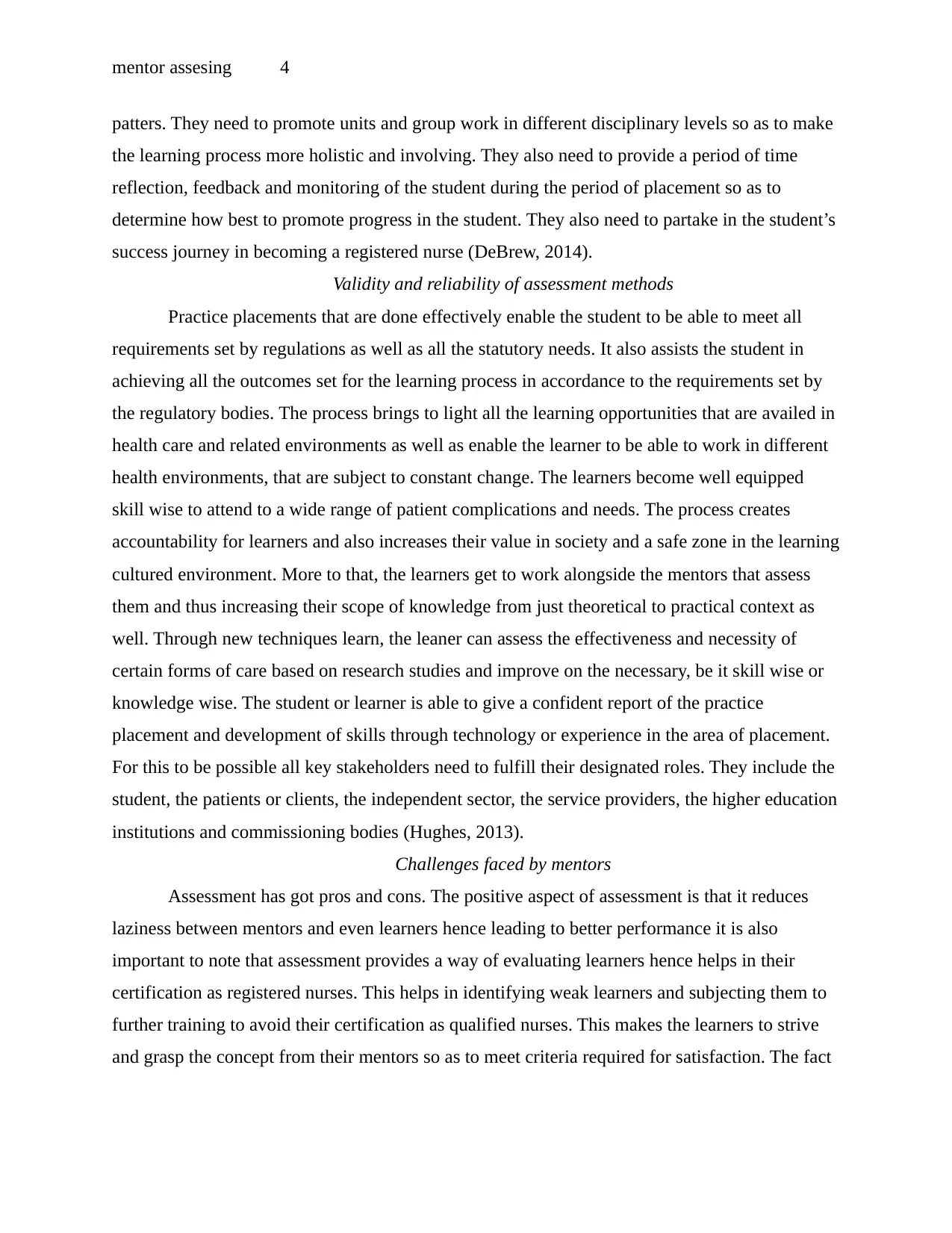
mentor assesing 4
patters. They need to promote units and group work in different disciplinary levels so as to make
the learning process more holistic and involving. They also need to provide a period of time
reflection, feedback and monitoring of the student during the period of placement so as to
determine how best to promote progress in the student. They also need to partake in the student’s
success journey in becoming a registered nurse (DeBrew, 2014).
Validity and reliability of assessment methods
Practice placements that are done effectively enable the student to be able to meet all
requirements set by regulations as well as all the statutory needs. It also assists the student in
achieving all the outcomes set for the learning process in accordance to the requirements set by
the regulatory bodies. The process brings to light all the learning opportunities that are availed in
health care and related environments as well as enable the learner to be able to work in different
health environments, that are subject to constant change. The learners become well equipped
skill wise to attend to a wide range of patient complications and needs. The process creates
accountability for learners and also increases their value in society and a safe zone in the learning
cultured environment. More to that, the learners get to work alongside the mentors that assess
them and thus increasing their scope of knowledge from just theoretical to practical context as
well. Through new techniques learn, the leaner can assess the effectiveness and necessity of
certain forms of care based on research studies and improve on the necessary, be it skill wise or
knowledge wise. The student or learner is able to give a confident report of the practice
placement and development of skills through technology or experience in the area of placement.
For this to be possible all key stakeholders need to fulfill their designated roles. They include the
student, the patients or clients, the independent sector, the service providers, the higher education
institutions and commissioning bodies (Hughes, 2013).
Challenges faced by mentors
Assessment has got pros and cons. The positive aspect of assessment is that it reduces
laziness between mentors and even learners hence leading to better performance it is also
important to note that assessment provides a way of evaluating learners hence helps in their
certification as registered nurses. This helps in identifying weak learners and subjecting them to
further training to avoid their certification as qualified nurses. This makes the learners to strive
and grasp the concept from their mentors so as to meet criteria required for satisfaction. The fact
patters. They need to promote units and group work in different disciplinary levels so as to make
the learning process more holistic and involving. They also need to provide a period of time
reflection, feedback and monitoring of the student during the period of placement so as to
determine how best to promote progress in the student. They also need to partake in the student’s
success journey in becoming a registered nurse (DeBrew, 2014).
Validity and reliability of assessment methods
Practice placements that are done effectively enable the student to be able to meet all
requirements set by regulations as well as all the statutory needs. It also assists the student in
achieving all the outcomes set for the learning process in accordance to the requirements set by
the regulatory bodies. The process brings to light all the learning opportunities that are availed in
health care and related environments as well as enable the learner to be able to work in different
health environments, that are subject to constant change. The learners become well equipped
skill wise to attend to a wide range of patient complications and needs. The process creates
accountability for learners and also increases their value in society and a safe zone in the learning
cultured environment. More to that, the learners get to work alongside the mentors that assess
them and thus increasing their scope of knowledge from just theoretical to practical context as
well. Through new techniques learn, the leaner can assess the effectiveness and necessity of
certain forms of care based on research studies and improve on the necessary, be it skill wise or
knowledge wise. The student or learner is able to give a confident report of the practice
placement and development of skills through technology or experience in the area of placement.
For this to be possible all key stakeholders need to fulfill their designated roles. They include the
student, the patients or clients, the independent sector, the service providers, the higher education
institutions and commissioning bodies (Hughes, 2013).
Challenges faced by mentors
Assessment has got pros and cons. The positive aspect of assessment is that it reduces
laziness between mentors and even learners hence leading to better performance it is also
important to note that assessment provides a way of evaluating learners hence helps in their
certification as registered nurses. This helps in identifying weak learners and subjecting them to
further training to avoid their certification as qualified nurses. This makes the learners to strive
and grasp the concept from their mentors so as to meet criteria required for satisfaction. The fact
Paraphrase This Document
Need a fresh take? Get an instant paraphrase of this document with our AI Paraphraser
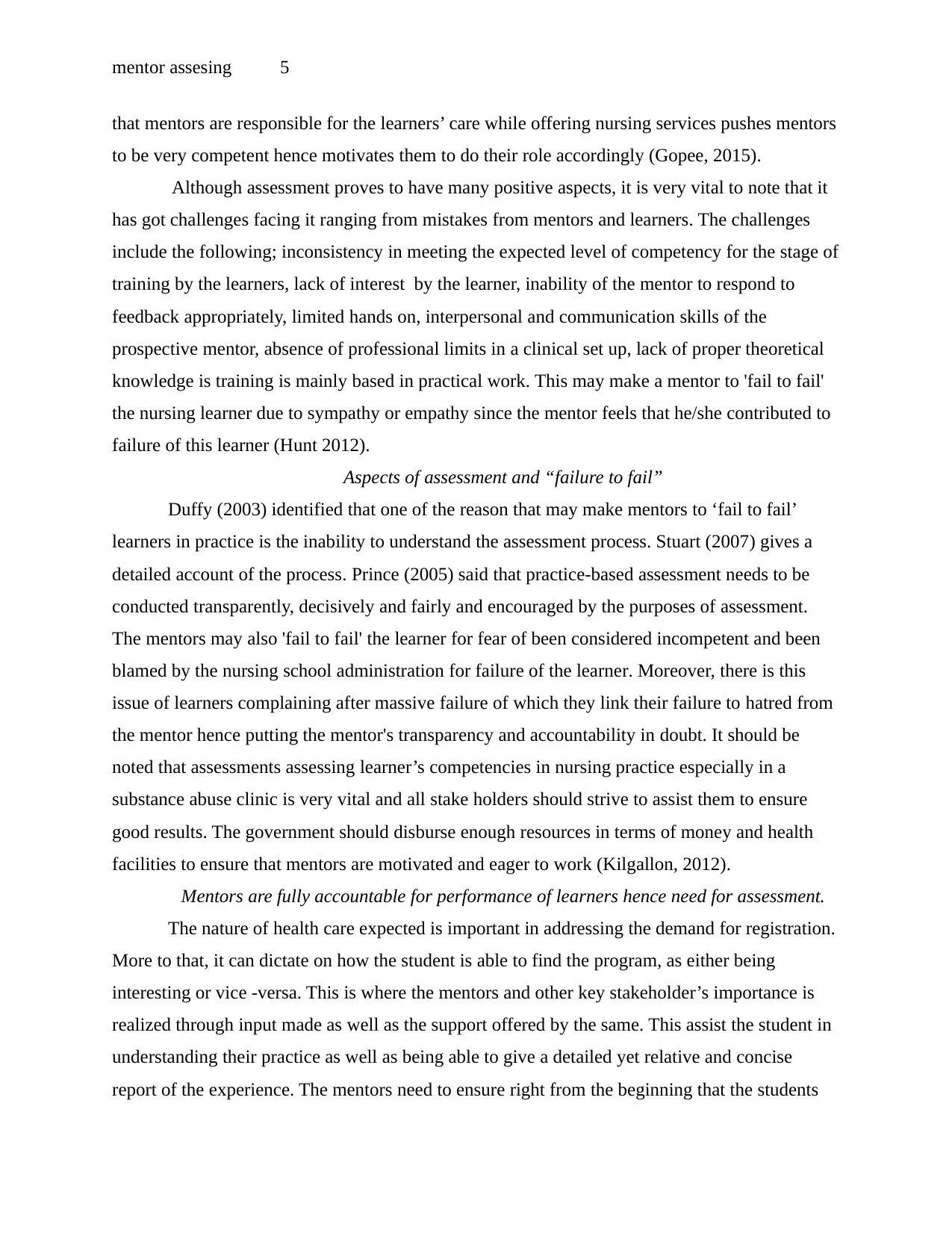
mentor assesing 5
that mentors are responsible for the learners’ care while offering nursing services pushes mentors
to be very competent hence motivates them to do their role accordingly (Gopee, 2015).
Although assessment proves to have many positive aspects, it is very vital to note that it
has got challenges facing it ranging from mistakes from mentors and learners. The challenges
include the following; inconsistency in meeting the expected level of competency for the stage of
training by the learners, lack of interest by the learner, inability of the mentor to respond to
feedback appropriately, limited hands on, interpersonal and communication skills of the
prospective mentor, absence of professional limits in a clinical set up, lack of proper theoretical
knowledge is training is mainly based in practical work. This may make a mentor to 'fail to fail'
the nursing learner due to sympathy or empathy since the mentor feels that he/she contributed to
failure of this learner (Hunt 2012).
Aspects of assessment and “failure to fail”
Duffy (2003) identified that one of the reason that may make mentors to ‘fail to fail’
learners in practice is the inability to understand the assessment process. Stuart (2007) gives a
detailed account of the process. Prince (2005) said that practice-based assessment needs to be
conducted transparently, decisively and fairly and encouraged by the purposes of assessment.
The mentors may also 'fail to fail' the learner for fear of been considered incompetent and been
blamed by the nursing school administration for failure of the learner. Moreover, there is this
issue of learners complaining after massive failure of which they link their failure to hatred from
the mentor hence putting the mentor's transparency and accountability in doubt. It should be
noted that assessments assessing learner’s competencies in nursing practice especially in a
substance abuse clinic is very vital and all stake holders should strive to assist them to ensure
good results. The government should disburse enough resources in terms of money and health
facilities to ensure that mentors are motivated and eager to work (Kilgallon, 2012).
Mentors are fully accountable for performance of learners hence need for assessment.
The nature of health care expected is important in addressing the demand for registration.
More to that, it can dictate on how the student is able to find the program, as either being
interesting or vice -versa. This is where the mentors and other key stakeholder’s importance is
realized through input made as well as the support offered by the same. This assist the student in
understanding their practice as well as being able to give a detailed yet relative and concise
report of the experience. The mentors need to ensure right from the beginning that the students
that mentors are responsible for the learners’ care while offering nursing services pushes mentors
to be very competent hence motivates them to do their role accordingly (Gopee, 2015).
Although assessment proves to have many positive aspects, it is very vital to note that it
has got challenges facing it ranging from mistakes from mentors and learners. The challenges
include the following; inconsistency in meeting the expected level of competency for the stage of
training by the learners, lack of interest by the learner, inability of the mentor to respond to
feedback appropriately, limited hands on, interpersonal and communication skills of the
prospective mentor, absence of professional limits in a clinical set up, lack of proper theoretical
knowledge is training is mainly based in practical work. This may make a mentor to 'fail to fail'
the nursing learner due to sympathy or empathy since the mentor feels that he/she contributed to
failure of this learner (Hunt 2012).
Aspects of assessment and “failure to fail”
Duffy (2003) identified that one of the reason that may make mentors to ‘fail to fail’
learners in practice is the inability to understand the assessment process. Stuart (2007) gives a
detailed account of the process. Prince (2005) said that practice-based assessment needs to be
conducted transparently, decisively and fairly and encouraged by the purposes of assessment.
The mentors may also 'fail to fail' the learner for fear of been considered incompetent and been
blamed by the nursing school administration for failure of the learner. Moreover, there is this
issue of learners complaining after massive failure of which they link their failure to hatred from
the mentor hence putting the mentor's transparency and accountability in doubt. It should be
noted that assessments assessing learner’s competencies in nursing practice especially in a
substance abuse clinic is very vital and all stake holders should strive to assist them to ensure
good results. The government should disburse enough resources in terms of money and health
facilities to ensure that mentors are motivated and eager to work (Kilgallon, 2012).
Mentors are fully accountable for performance of learners hence need for assessment.
The nature of health care expected is important in addressing the demand for registration.
More to that, it can dictate on how the student is able to find the program, as either being
interesting or vice -versa. This is where the mentors and other key stakeholder’s importance is
realized through input made as well as the support offered by the same. This assist the student in
understanding their practice as well as being able to give a detailed yet relative and concise
report of the experience. The mentors need to ensure right from the beginning that the students
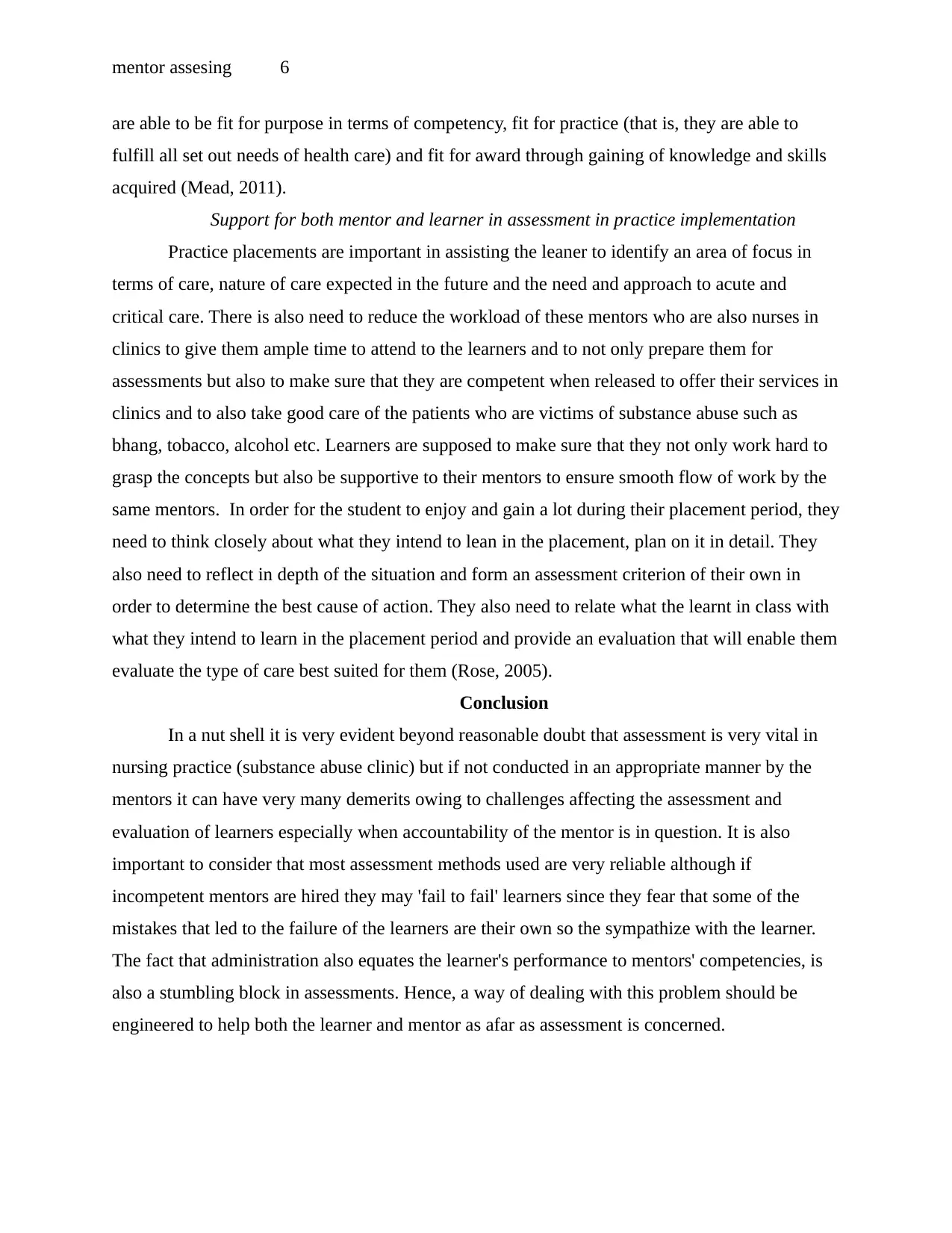
mentor assesing 6
are able to be fit for purpose in terms of competency, fit for practice (that is, they are able to
fulfill all set out needs of health care) and fit for award through gaining of knowledge and skills
acquired (Mead, 2011).
Support for both mentor and learner in assessment in practice implementation
Practice placements are important in assisting the leaner to identify an area of focus in
terms of care, nature of care expected in the future and the need and approach to acute and
critical care. There is also need to reduce the workload of these mentors who are also nurses in
clinics to give them ample time to attend to the learners and to not only prepare them for
assessments but also to make sure that they are competent when released to offer their services in
clinics and to also take good care of the patients who are victims of substance abuse such as
bhang, tobacco, alcohol etc. Learners are supposed to make sure that they not only work hard to
grasp the concepts but also be supportive to their mentors to ensure smooth flow of work by the
same mentors. In order for the student to enjoy and gain a lot during their placement period, they
need to think closely about what they intend to lean in the placement, plan on it in detail. They
also need to reflect in depth of the situation and form an assessment criterion of their own in
order to determine the best cause of action. They also need to relate what the learnt in class with
what they intend to learn in the placement period and provide an evaluation that will enable them
evaluate the type of care best suited for them (Rose, 2005).
Conclusion
In a nut shell it is very evident beyond reasonable doubt that assessment is very vital in
nursing practice (substance abuse clinic) but if not conducted in an appropriate manner by the
mentors it can have very many demerits owing to challenges affecting the assessment and
evaluation of learners especially when accountability of the mentor is in question. It is also
important to consider that most assessment methods used are very reliable although if
incompetent mentors are hired they may 'fail to fail' learners since they fear that some of the
mistakes that led to the failure of the learners are their own so the sympathize with the learner.
The fact that administration also equates the learner's performance to mentors' competencies, is
also a stumbling block in assessments. Hence, a way of dealing with this problem should be
engineered to help both the learner and mentor as afar as assessment is concerned.
are able to be fit for purpose in terms of competency, fit for practice (that is, they are able to
fulfill all set out needs of health care) and fit for award through gaining of knowledge and skills
acquired (Mead, 2011).
Support for both mentor and learner in assessment in practice implementation
Practice placements are important in assisting the leaner to identify an area of focus in
terms of care, nature of care expected in the future and the need and approach to acute and
critical care. There is also need to reduce the workload of these mentors who are also nurses in
clinics to give them ample time to attend to the learners and to not only prepare them for
assessments but also to make sure that they are competent when released to offer their services in
clinics and to also take good care of the patients who are victims of substance abuse such as
bhang, tobacco, alcohol etc. Learners are supposed to make sure that they not only work hard to
grasp the concepts but also be supportive to their mentors to ensure smooth flow of work by the
same mentors. In order for the student to enjoy and gain a lot during their placement period, they
need to think closely about what they intend to lean in the placement, plan on it in detail. They
also need to reflect in depth of the situation and form an assessment criterion of their own in
order to determine the best cause of action. They also need to relate what the learnt in class with
what they intend to learn in the placement period and provide an evaluation that will enable them
evaluate the type of care best suited for them (Rose, 2005).
Conclusion
In a nut shell it is very evident beyond reasonable doubt that assessment is very vital in
nursing practice (substance abuse clinic) but if not conducted in an appropriate manner by the
mentors it can have very many demerits owing to challenges affecting the assessment and
evaluation of learners especially when accountability of the mentor is in question. It is also
important to consider that most assessment methods used are very reliable although if
incompetent mentors are hired they may 'fail to fail' learners since they fear that some of the
mistakes that led to the failure of the learners are their own so the sympathize with the learner.
The fact that administration also equates the learner's performance to mentors' competencies, is
also a stumbling block in assessments. Hence, a way of dealing with this problem should be
engineered to help both the learner and mentor as afar as assessment is concerned.
⊘ This is a preview!⊘
Do you want full access?
Subscribe today to unlock all pages.

Trusted by 1+ million students worldwide
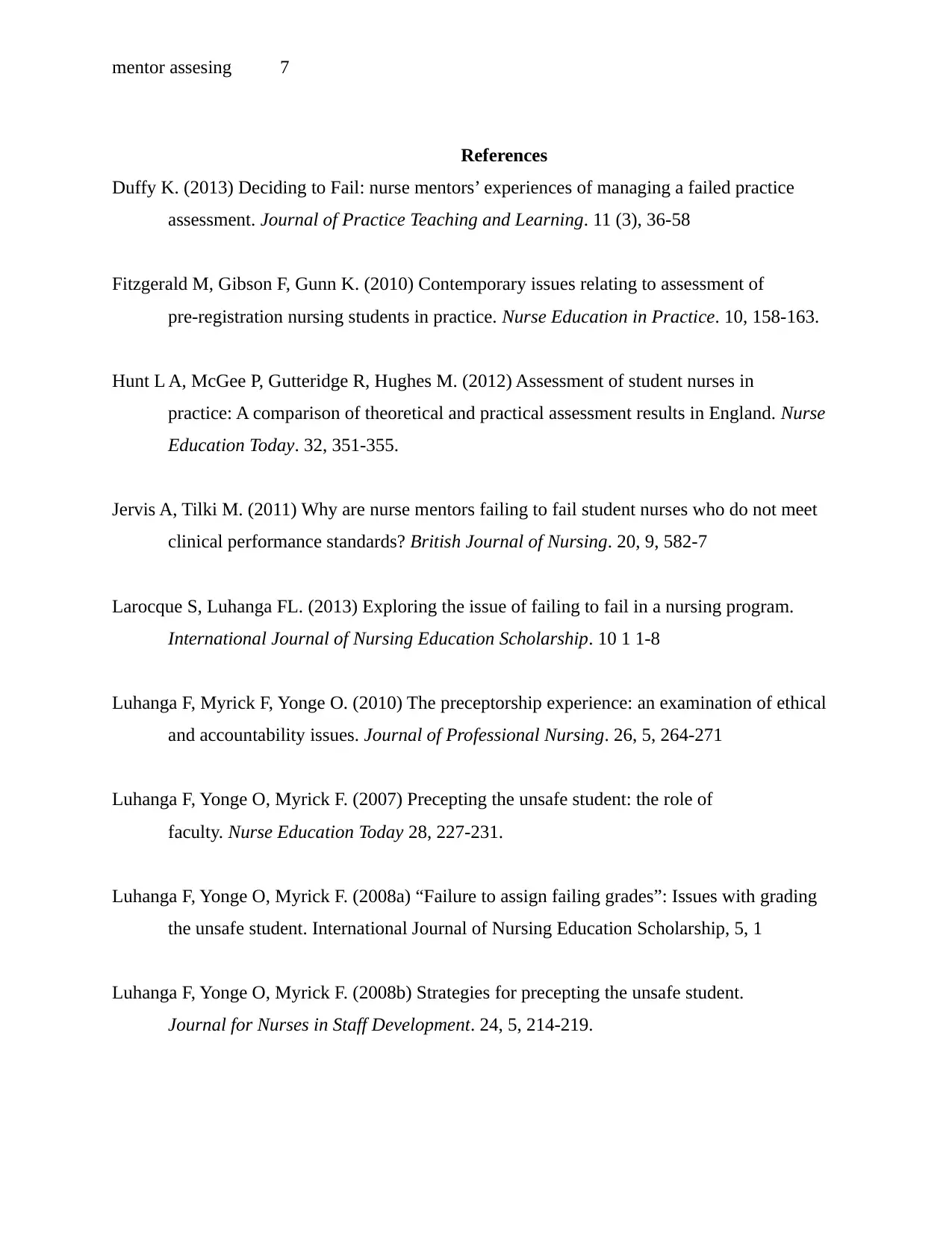
mentor assesing 7
References
Duffy K. (2013) Deciding to Fail: nurse mentors’ experiences of managing a failed practice
assessment. Journal of Practice Teaching and Learning. 11 (3), 36-58
Fitzgerald M, Gibson F, Gunn K. (2010) Contemporary issues relating to assessment of
pre-registration nursing students in practice. Nurse Education in Practice. 10, 158-163.
Hunt L A, McGee P, Gutteridge R, Hughes M. (2012) Assessment of student nurses in
practice: A comparison of theoretical and practical assessment results in England. Nurse
Education Today. 32, 351-355.
Jervis A, Tilki M. (2011) Why are nurse mentors failing to fail student nurses who do not meet
clinical performance standards? British Journal of Nursing. 20, 9, 582-7
Larocque S, Luhanga FL. (2013) Exploring the issue of failing to fail in a nursing program.
International Journal of Nursing Education Scholarship. 10 1 1-8
Luhanga F, Myrick F, Yonge O. (2010) The preceptorship experience: an examination of ethical
and accountability issues. Journal of Professional Nursing. 26, 5, 264-271
Luhanga F, Yonge O, Myrick F. (2007) Precepting the unsafe student: the role of
faculty. Nurse Education Today 28, 227-231.
Luhanga F, Yonge O, Myrick F. (2008a) “Failure to assign failing grades”: Issues with grading
the unsafe student. International Journal of Nursing Education Scholarship, 5, 1
Luhanga F, Yonge O, Myrick F. (2008b) Strategies for precepting the unsafe student.
Journal for Nurses in Staff Development. 24, 5, 214-219.
References
Duffy K. (2013) Deciding to Fail: nurse mentors’ experiences of managing a failed practice
assessment. Journal of Practice Teaching and Learning. 11 (3), 36-58
Fitzgerald M, Gibson F, Gunn K. (2010) Contemporary issues relating to assessment of
pre-registration nursing students in practice. Nurse Education in Practice. 10, 158-163.
Hunt L A, McGee P, Gutteridge R, Hughes M. (2012) Assessment of student nurses in
practice: A comparison of theoretical and practical assessment results in England. Nurse
Education Today. 32, 351-355.
Jervis A, Tilki M. (2011) Why are nurse mentors failing to fail student nurses who do not meet
clinical performance standards? British Journal of Nursing. 20, 9, 582-7
Larocque S, Luhanga FL. (2013) Exploring the issue of failing to fail in a nursing program.
International Journal of Nursing Education Scholarship. 10 1 1-8
Luhanga F, Myrick F, Yonge O. (2010) The preceptorship experience: an examination of ethical
and accountability issues. Journal of Professional Nursing. 26, 5, 264-271
Luhanga F, Yonge O, Myrick F. (2007) Precepting the unsafe student: the role of
faculty. Nurse Education Today 28, 227-231.
Luhanga F, Yonge O, Myrick F. (2008a) “Failure to assign failing grades”: Issues with grading
the unsafe student. International Journal of Nursing Education Scholarship, 5, 1
Luhanga F, Yonge O, Myrick F. (2008b) Strategies for precepting the unsafe student.
Journal for Nurses in Staff Development. 24, 5, 214-219.
Paraphrase This Document
Need a fresh take? Get an instant paraphrase of this document with our AI Paraphraser
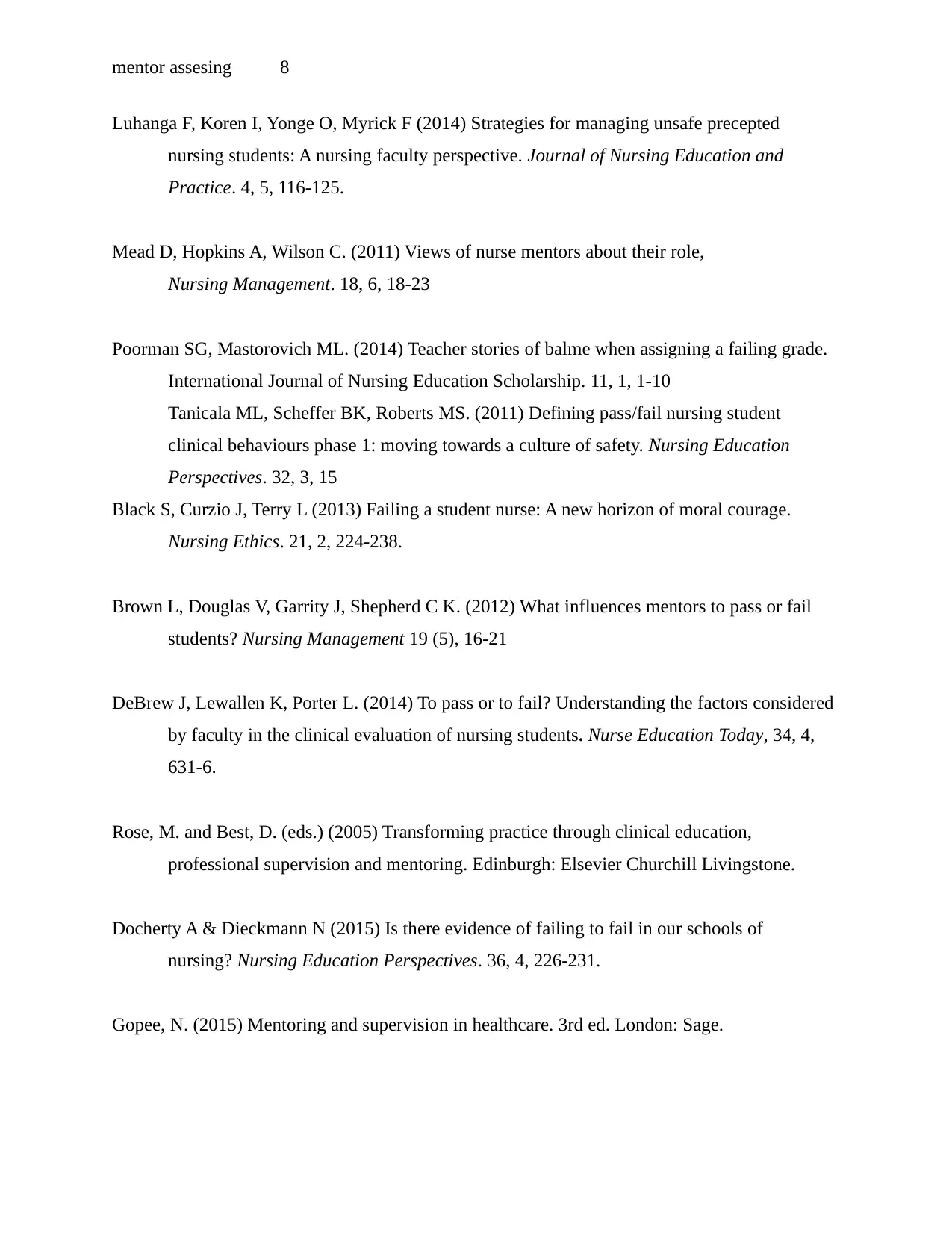
mentor assesing 8
Luhanga F, Koren I, Yonge O, Myrick F (2014) Strategies for managing unsafe precepted
nursing students: A nursing faculty perspective. Journal of Nursing Education and
Practice. 4, 5, 116-125.
Mead D, Hopkins A, Wilson C. (2011) Views of nurse mentors about their role,
Nursing Management. 18, 6, 18-23
Poorman SG, Mastorovich ML. (2014) Teacher stories of balme when assigning a failing grade.
International Journal of Nursing Education Scholarship. 11, 1, 1-10
Tanicala ML, Scheffer BK, Roberts MS. (2011) Defining pass/fail nursing student
clinical behaviours phase 1: moving towards a culture of safety. Nursing Education
Perspectives. 32, 3, 15
Black S, Curzio J, Terry L (2013) Failing a student nurse: A new horizon of moral courage.
Nursing Ethics. 21, 2, 224-238.
Brown L, Douglas V, Garrity J, Shepherd C K. (2012) What influences mentors to pass or fail
students? Nursing Management 19 (5), 16-21
DeBrew J, Lewallen K, Porter L. (2014) To pass or to fail? Understanding the factors considered
by faculty in the clinical evaluation of nursing students. Nurse Education Today, 34, 4,
631-6.
Rose, M. and Best, D. (eds.) (2005) Transforming practice through clinical education,
professional supervision and mentoring. Edinburgh: Elsevier Churchill Livingstone.
Docherty A & Dieckmann N (2015) Is there evidence of failing to fail in our schools of
nursing? Nursing Education Perspectives. 36, 4, 226-231.
Gopee, N. (2015) Mentoring and supervision in healthcare. 3rd ed. London: Sage.
Luhanga F, Koren I, Yonge O, Myrick F (2014) Strategies for managing unsafe precepted
nursing students: A nursing faculty perspective. Journal of Nursing Education and
Practice. 4, 5, 116-125.
Mead D, Hopkins A, Wilson C. (2011) Views of nurse mentors about their role,
Nursing Management. 18, 6, 18-23
Poorman SG, Mastorovich ML. (2014) Teacher stories of balme when assigning a failing grade.
International Journal of Nursing Education Scholarship. 11, 1, 1-10
Tanicala ML, Scheffer BK, Roberts MS. (2011) Defining pass/fail nursing student
clinical behaviours phase 1: moving towards a culture of safety. Nursing Education
Perspectives. 32, 3, 15
Black S, Curzio J, Terry L (2013) Failing a student nurse: A new horizon of moral courage.
Nursing Ethics. 21, 2, 224-238.
Brown L, Douglas V, Garrity J, Shepherd C K. (2012) What influences mentors to pass or fail
students? Nursing Management 19 (5), 16-21
DeBrew J, Lewallen K, Porter L. (2014) To pass or to fail? Understanding the factors considered
by faculty in the clinical evaluation of nursing students. Nurse Education Today, 34, 4,
631-6.
Rose, M. and Best, D. (eds.) (2005) Transforming practice through clinical education,
professional supervision and mentoring. Edinburgh: Elsevier Churchill Livingstone.
Docherty A & Dieckmann N (2015) Is there evidence of failing to fail in our schools of
nursing? Nursing Education Perspectives. 36, 4, 226-231.
Gopee, N. (2015) Mentoring and supervision in healthcare. 3rd ed. London: Sage.
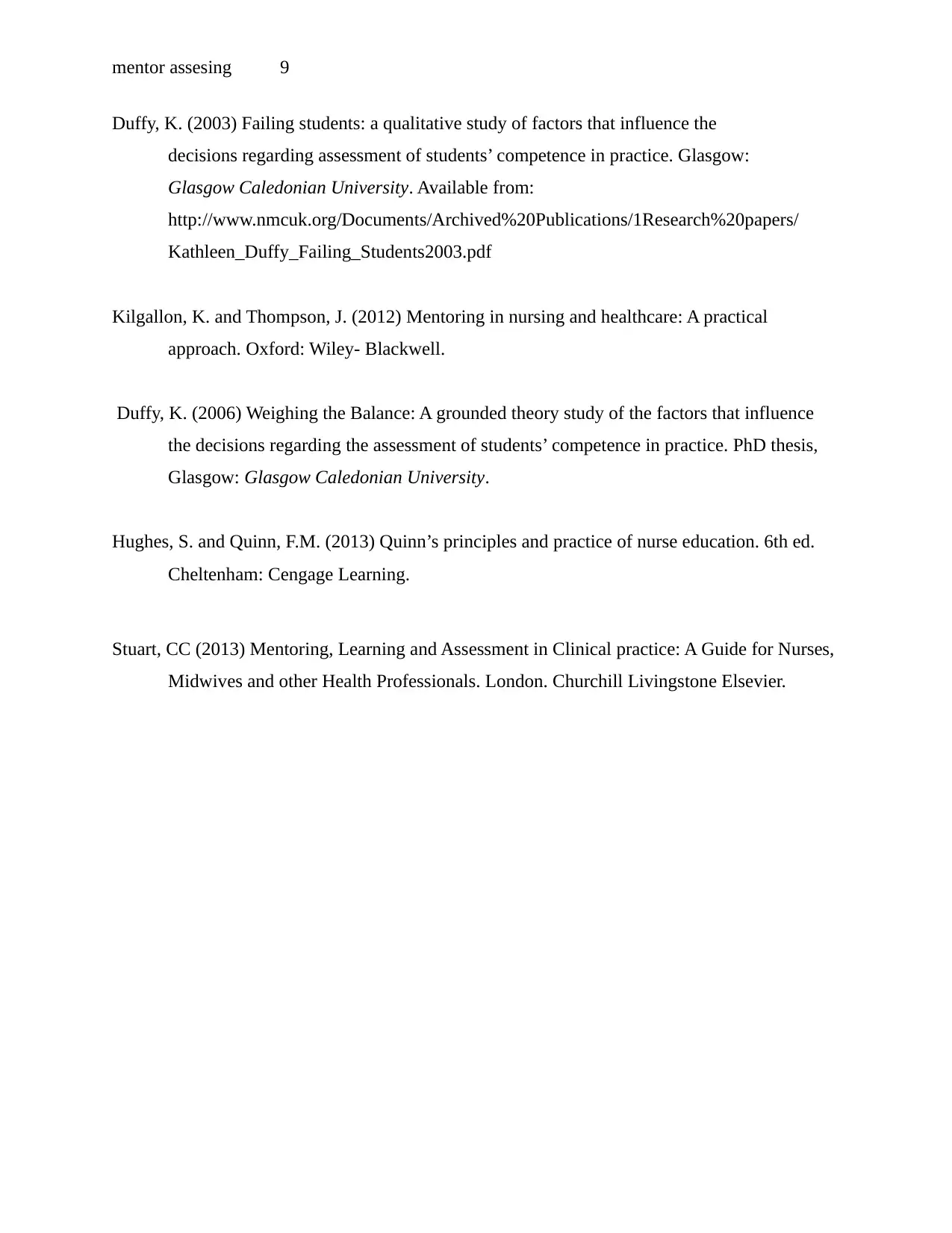
mentor assesing 9
Duffy, K. (2003) Failing students: a qualitative study of factors that influence the
decisions regarding assessment of students’ competence in practice. Glasgow:
Glasgow Caledonian University. Available from:
http://www.nmcuk.org/Documents/Archived%20Publications/1Research%20papers/
Kathleen_Duffy_Failing_Students2003.pdf
Kilgallon, K. and Thompson, J. (2012) Mentoring in nursing and healthcare: A practical
approach. Oxford: Wiley- Blackwell.
Duffy, K. (2006) Weighing the Balance: A grounded theory study of the factors that influence
the decisions regarding the assessment of students’ competence in practice. PhD thesis,
Glasgow: Glasgow Caledonian University.
Hughes, S. and Quinn, F.M. (2013) Quinn’s principles and practice of nurse education. 6th ed.
Cheltenham: Cengage Learning.
Stuart, CC (2013) Mentoring, Learning and Assessment in Clinical practice: A Guide for Nurses,
Midwives and other Health Professionals. London. Churchill Livingstone Elsevier.
Duffy, K. (2003) Failing students: a qualitative study of factors that influence the
decisions regarding assessment of students’ competence in practice. Glasgow:
Glasgow Caledonian University. Available from:
http://www.nmcuk.org/Documents/Archived%20Publications/1Research%20papers/
Kathleen_Duffy_Failing_Students2003.pdf
Kilgallon, K. and Thompson, J. (2012) Mentoring in nursing and healthcare: A practical
approach. Oxford: Wiley- Blackwell.
Duffy, K. (2006) Weighing the Balance: A grounded theory study of the factors that influence
the decisions regarding the assessment of students’ competence in practice. PhD thesis,
Glasgow: Glasgow Caledonian University.
Hughes, S. and Quinn, F.M. (2013) Quinn’s principles and practice of nurse education. 6th ed.
Cheltenham: Cengage Learning.
Stuart, CC (2013) Mentoring, Learning and Assessment in Clinical practice: A Guide for Nurses,
Midwives and other Health Professionals. London. Churchill Livingstone Elsevier.
⊘ This is a preview!⊘
Do you want full access?
Subscribe today to unlock all pages.

Trusted by 1+ million students worldwide
1 out of 9
Related Documents
Your All-in-One AI-Powered Toolkit for Academic Success.
+13062052269
info@desklib.com
Available 24*7 on WhatsApp / Email
![[object Object]](/_next/static/media/star-bottom.7253800d.svg)
Unlock your academic potential
Copyright © 2020–2026 A2Z Services. All Rights Reserved. Developed and managed by ZUCOL.





